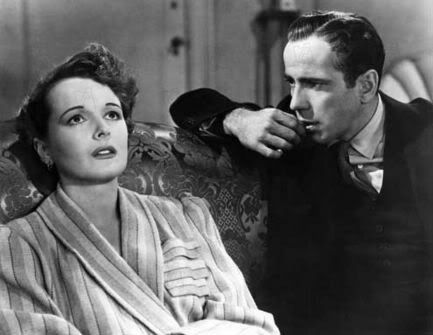The stuff that dreams are made of
I watched The Maltese Falcon again tonight, which certainly (checks Ebert) is one of the greatest films ever made. Odd, I watch it about once a decade and each time it seems to some degree unfamiliar, almost like watching a new movie.
In my 20s I certainly didn't catch the subtlety of the interplay between Bogart and Mary Astor - the way they are constantly looking at one another, checking one another. I certainly never got, until tonight, the rich irony of Spade's infatuation and disappointment in Brigid. The initial interest and delight in the discovery of a kindred spirit - someone who could work a scam as well as he - and the gradual, crushing realization that she is really evil. And my goodness, Mary Astor could act, couldn't she?
"I've been bad, worse than you could know..."

(Nor did I quite register Cairo fellating his cane during the consultation in Spade's office...well, there were a lot of things I didn't notice in my 20s.)
Back then I took greater note of Spade's sadism - the evident pleasure he takes in beating up Cairo and showing up Wilmer, acting like a lunatic when bluffing the Fat Man then laughing about it in the hallway, fingering Astor's "pretty little neck" as he talks about her going to the gallows. None of that seems so shocking to me now. Spade is in character. To have the justice his code demands, he has to go in with thieves and become one.
Without losing his mind. Throughout the film (and the book, as Huston took most dialogue verbatim) Spade is scolding others to keep their heads. In the intimacy of mortal confrontation, it is Gutman who calls him on it:
Spade knows he cannot afford the slightest concession to human feeling. And while this sacrifice gives him victory, what does he really win? He will not get the falcon, the money, or the woman. He has to risk everything to fulfill the demands of honor, and all he really gets is an exemption (temporary?) from the gallows. A dark message from the dark world of 1941.That's an attitude, sir, that calls for the most delicate judgment on both sides. 'Cause as you know, sir, in the heat of action men are likely to forget where their best interests lie and let their emotions carry them away.
While abroad I paid good money for David Thomson's book on Bogart, which I discover is not yet available in the States. Well, when it comes out be sure to have a look, at 120 pages it is an expensive but rewarding confection. Thomson is a tough grader:
After Dark Passage, Bogart would make another nineteen pictures. Of those, four or five are keepers that anyone can still see with profit and pleasure. And one is as good as anything he ever did. The others are humdrum or worse. We are talking about a man who made four great pictures in his life.
As many as that?
Smartass. Who made more? Here is someone's list of the ten most influential films of the 40s - Bogart has three of them. And he wasn't just in them, he made them. People can talk about John Wayne or Gary Cooper as the model of American manhood. Today it's Brad Pitt, I suppose ("prettier and dumber", one of those snooty Europeans observed).
But Bogart was the more potent model. In his best roles he was at pains to represent a flawed human being, not an idealized hero figure. In The Maltese Falcon and Casablanca, at least, he was the hero in spite of himself - a tough guy in a bad world with a strong inner need to do right by someone. Bogart worked nervously on his lines alone for hours, until they came naturally, always trying to take stuff out, trying to keep the hard edge on the delivery. But, as Thomson observes,
It all works as speech until you look at the imploring eyes, longing to be believed, trying to believe.


4 Comments:
Damn great list. It should be no surprise that these movies- and Dashiell Hammet, is a big favorite of mine. Even Bogart's bady guys are fully humanized: Treasure of the Sierra Madre is a timeless take on greed. That it leaves out the 40s propaganda movies is a mistake I think- Sahara! can strike modern audiences as hokie, but that ugly little tank crawling hopelessly through the desert is one of my favorite film images. The Big Sleep (the one even William Faulkner couldn't explain) and To Have and Have Not? Who cannot love these?
You mean the Sahara with Bogart in it right? Not the remake with Jim Belushi?
http://www.imdb.com/title/tt0114324/
While I love the original to death, and wanted to hate the remake, it was kinda good....Should I not have admitted that. Am I banned?
The silence is deafening.
You are... lemme check... yes, you are banned.
Post a Comment
<< Home